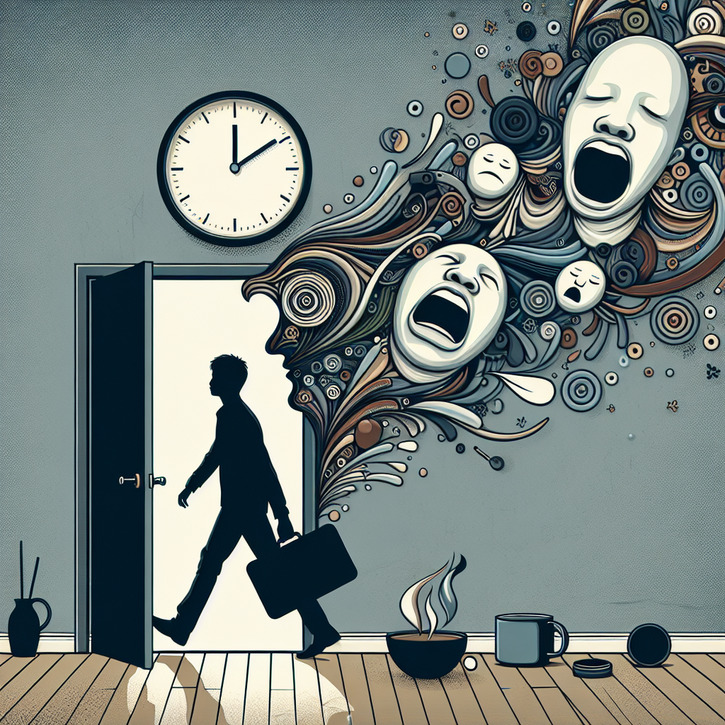Breaking the Cycle of Chronic Sleep Issues

Introduction: Kicking Off Our Chat About Chronic Sleep Woes
These days, battling chronic sleep issues feels all too common—a nagging problem that leaves us feeling utterly drained and out of sync with life. In this post, we’re taking a deep dive into what these sleep struggles really mean and how they ripple out to affect our overall well-being. It’s not just a case of tossing and turning; there’s a whole mix of biological quirks, environmental factors, and emotional ups and downs turning bedtime into a bit of a maze. Here, we’re not just unpacking the problem—we’re also throwing around some practical tips to help you break the cycle and reclaim more restful nights. With nuggets of wisdom from lifestyle tips and solid medical research, we’re here to help guide you gently towards sleeping soundly again.
What Are Chronic Sleep Issues, Anyway?
Let’s start by getting on the same page about what we mean by chronic sleep issues. This term covers everything from insomnia and broken sleep to those recurring patterns that just refuse to give you the deep, restorative nap you need. These problems don’t play favorites—they can hit anyone, regardless of age or lifestyle. And when these sleep troubles drag on for weeks or months, they morph into a chronic condition that can ramp up stress, anxiety, and even lead to other health problems. Spotting the early signs and admitting that something’s off is the first step toward taking back control of both your sleep and your health.
How Poor Sleep Messes with Our Overall Well-Being
Sleep is the glue that holds our physical and mental health together. When chronic sleep issues creep in, you might start noticing a whole array of other challenges—from foggy thinking and memory slips to a weakened immune system. The effects of a restless night stretch far beyond just feeling groggy in the morning; they seep into work, relationships, and even your sense of safety. As sleep issues pile up, they can lead to constant fatigue and emotional rollercoasters, ultimately affecting every corner of your everyday life. Tackling these issues head-on can not only pump up your energy and improve your mood but also set the stage for better long-term health.
Why Breaking the Cycle Is a Gamechanger
Breaking the vicious cycle of poor sleep isn’t just about clocking more Zzz’s—it’s about taking a real step toward better overall well-being. Unresolved sleep problems can be the hidden trigger behind a range of health issues, from chronic stress and anxiety to even hearing difficulties that impact your quality of life. By addressing these patterns head-on, you nurture a mindset that values rest and recovery, letting your body and brain get the time they need to heal and rejuvenate. When you view sleep as a vital, non-negotiable part of your routine, it’s amazing how positive changes can ripple out into every other part of your life.
Digging Into the Root Causes of Sleep Troubles
As we peel back the layers on sleep issues, it’s important to acknowledge the many factors at play. More often than not, chronic sleep problems aren’t caused by one single issue—they’re the result of a complicated dance between biology, brain function, lifestyle habits, and even what’s going on around you. Everyone’s sleep puzzle is a little different, and figuring out lasting solutions can be as intriguing as it is challenging. In our conversation today, we’ll lean on insights from research and clinical knowledge to shed light on the sneaky factors that might be quietly sabotaging your sleep.
The Role of Biology and Brain Function
Our bodies and brains are in constant conversation with one another, and a lot of our sleep troubles have deep biological roots. Take hormonal imbalances, for example—they can throw your body’s internal clock (that trusty circadian rhythm) completely off track. Likewise, neurological issues or even past injuries can make it hard for the brain to slip into a restful state. These inner workings might not be as obvious as environmental factors, but they pack a real punch. Sometimes, getting to the bottom of these issues means consulting a healthcare pro, who can point you to treatments that make a world of difference over time.
How Your Environment and Lifestyle Come Into Play
What we do every day and the environment we live in have a huge impact on how well we sleep. That pesky blue light from our screens, irregular mealtimes, or even a bedroom that just isn’t cozy enough can throw your sleep cycle for a loop. Add urban noise, unpredictable work hours, and the constant pings of modern technology into the mix, and it’s no wonder our sleep gets compromised. Many sleep issues actually stem from the daily habits we develop and the environments we choose—or sometimes, neglect—to set up for good rest. A few tweaks here and there can help create a sleep-friendly space, paving the way for better nights.
When Emotions and the Mind Sabotage Sleep
Let’s not forget about the mind, which often bears the brunt of a bad night’s sleep. Stress, chronic anxiety, or emotional upheavals can really throw a wrench into your ability to wind down. When your thoughts are racing or you’re caught in a loop of worry about daily hassles, drifting off can seem like scaling a mountain. This mental tug-of-war not only feeds into sleep issues but also creates a tricky cycle between your mood and sleep quality. Pinpointing these emotional triggers is a big piece of the puzzle, opening the door to practices like therapy or mindfulness that can help you rediscover your calm.
Getting a Medical Take on Sleep Issues
While adjusting lifestyle habits and tackling stress are crucial, sometimes a medical perspective is necessary—especially when sleep problems have become a chronic burden. Chatting with a healthcare professional can unearth any underlying conditions that might be throwing your sleep patterns off-kilter. Whether it’s through tests or a referral to a sleep specialist, getting a detailed diagnosis can really shine a light on issues you might not have even considered. Basing your decisions on solid professional advice is an essential part of reclaiming quality rest.
When to Know It’s Time for a Medical Check-Up
Figuring out when to reach out to a doctor is key to managing chronic sleep problems. If your issues have been dragging on for several weeks or months, or if you’re battling constant fatigue, mood swings, or brain fog, it might be time for a professional opinion. A healthcare provider can help rule out conditions like sleep apnea, restless leg syndrome, or hormonal imbalances that might be sabotaging your sleep. Early detection means you can jump into targeted treatments before these issues snowball into something more serious.
Common Health Hurdles That Disrupt Sleep
There are several health conditions known to put a serious damper on your ability to sleep well. Sleep apnea, depression, and chronic pain are a few common culprits that can cause enduring sleep problems. Even metabolic issues, like thyroid disorders or diabetes, have been linked to restless nights. These conditions often start subtly—with trouble falling asleep or staying asleep—but recognizing their impact can empower you to take a more holistic approach to your health, tackling both the symptoms and the root causes for a more balanced body and mind.
How Lifestyle Choices Impact Your Sleep
What you do day in and day out plays a huge role in how well you sleep at night. Living a balanced life—complete with regular exercise, good nutrition, and steady routines—can really help smooth out sleep issues. On the flip side, irregular schedules, poor eating habits, and a sedentary lifestyle can set off a cascade of problems that rob you of a deep, restorative sleep. In the next part of our chat, we’ll look at how little tweaks to your routine can help break the cycle of sleep disturbances, blending old-school wisdom with fresh, modern insights.
The Magic of Good Sleep Habits and Daily Routines
Ever heard the saying “old habits die hard”? When it comes to sleep, your daily habits are the foundation. Things like keeping regular sleep and wake times and carving out a calm, inviting bedroom space are at the heart of good sleep hygiene. When your routines sync up with your body’s natural clock, you reduce those pesky interruptions that can derail your sleep. Simple adjustments—like dimming the lights an hour before bed, cutting back on late-day caffeine, or enjoying a relaxing pre-bed ritual—can make a big difference in setting up a smooth sleep cycle.
How Diet and Exercise Can Turn Your Sleep Around
What’s on your plate and how you move your body also play starring roles in your sleep story. A balanced diet rich in nutrients can help regulate those sleep-related hormones, and regular exercise works wonders by burning off tension and boosting overall energy. Just remember, timing matters: a heavy meal or intense workout right before bed might actually keep you awake. Balancing mindful eating with smart exercise timing can really help pave the way for a more consistent sleep pattern. Even small changes in these areas can set off a chain reaction of positive results, leaving you more refreshed by morning.
Managing Stress for Better Slumber
Modern life doesn’t make it easy to shut off the stress—our minds are often buzzing with everything that needs to get done. When anxiety takes center stage, falling into a deep sleep can feel nearly impossible. Techniques like guided meditation, gentle yoga, or even some simple deep breathing exercises can help shift your focus away from those nagging worries. Taking a few moments during your day to relax can build up a buffer against stress, making it easier to drift off at night. Not only will this help ease your sleep woes, but it’ll also build up your overall resilience so you can handle daily challenges with a bit more calm.
Practical Strategies to Break Free from Sleep Struggles
Conquering chronic sleep issues takes grit, consistency, and a little bit of creativity. After exploring all the different factors—from biology and lifestyle to emotional triggers—it’s time to translate that understanding into some actionable steps. Whether it’s fine-tuning your daily routine or weaving in a few mindful practices, every little adjustment can set you on the path to better sleep. The strategies we share here mix tried-and-true methods with modern tweaks to offer you a roadmap out of restless nights and into a life recharged by genuine, restorative sleep.
Sticking to a Consistent Sleep Schedule
Sometimes, the most straightforward fix is simply getting into a regular sleep pattern. By going to bed and waking up at the same time every day—even on weekends—you help your body lock into its natural rhythm. Once your internal clock gets used to a routine, falling asleep becomes less of a battle, and you’re less likely to find yourself lying awake for hours. It might take some effort to stick with it, but a steady sleep schedule can pave the way for more consistent, deep sleep.
Embracing Mindfulness and Relaxation Techniques
For many of us, winding down is easier said than done. That's where mindfulness and relaxation techniques come into play. Whether it’s deep breathing, progressive muscle relaxation, or even guided imagery, these practices can help quiet those racing thoughts and set the stage for sleep. The more you practice, the more you'll notice your mind easing into a state of calm, turning bedtime into less of a battleground and more of a peaceful retreat. Over time, these small practices can transform your nightly routine into a soothing ritual that helps you drift off naturally.
Exploring Behavioral Therapies to Tackle Sleep Troubles
Behavioral therapies, especially Cognitive Behavioral Therapy (CBT), have really come into the spotlight as a powerhouse approach for chronic sleep issues. Unlike shaving off just the obvious symptoms, these therapies dive into the thought patterns and habits that might be fueling your sleepless nights. Gaining insight into how your thoughts connect to your sleep quality can empower you to break the cycle once and for all. This guided process helps you pinpoint triggers, challenge those negative thought loops, and gradually adopt changes that lead to better, sustained sleep.
The Lowdown on Cognitive Behavioral Therapy (CBT) for Sleep
CBT is all about understanding that our thoughts and beliefs can really shape our behaviors—including how we sleep. Through this approach, you learn to spot and then challenge the thought patterns that are keeping you awake. Techniques might include keeping a sleep diary, practicing regular relaxation, and exposing yourself gradually to fears related to sleep. For many, CBT doesn’t just improve sleep; it also lifts the overall quality of life by offering practical, lasting solutions.
Using Sleep Restriction and Stimulus Control Techniques
In addition to reshaping thoughts, certain behavioral methods can also work wonders. Sleep restriction involves limiting your time in bed to match the actual amount of sleep you get—this helps boost sleep efficiency over time. On the other hand, stimulus control helps reforge the connection between your bed and sleep, ensuring that your bedroom stays a haven for rest only, not anxiety. Many folks report that these structured methods help bring much-needed consistency and quality back to their nights.
Crafting a Sleep-Friendly Environment
Sometimes, your surroundings can be the key to unlocking a good night’s sleep. Tweaking your sleep environment can make a world of difference. Think of it as creating your very own sanctuary that nurtures calm and relaxation. In this section, we’ll share ideas on building a supportive network, setting up your bedroom to invite rest, and managing tech exposure so that you’re not fighting off distractions when you slide under the covers. A thoughtful environment not only makes it easier to fall asleep, but it also underpins a mindset that truly values rest and self-care.
Finding Your Tribe: Support Systems and Professional Help
Facing sleep issues can sometimes feel like you’re in it all alone. But remember, you’re not! Whether it’s leaning on family, joining sleep support groups, or getting guidance from a sleep therapist, a strong support network can be a game-changer. Professionals can offer personalized strategies to tackle stress and help you gently steer back toward better sleep. Having someone to talk to about the ups and downs of sleep can turn the whole experience around, making recovery feel a lot less daunting.






